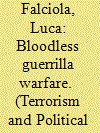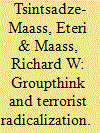| Srl | Item |
| 1 |
ID:
148936


|
|
|
|
|
| Summary/Abstract |
Between 1968 and the late 1970s, a significant number of U.S. white leftist groups escalated their protest to armed struggle. After experimenting briefly with violence, they opted for low-intensity armed propaganda that targeted property and avoided hurting people. By contrast, European leftist groups and anti-colonial organizations in the U.S. made extensive use of antipersonnel violence. Why did U.S. leftists eschew attacks against civilians? Scholarship does not explain this case, as it focuses either on the internal dynamics of a single group or on structural variables. Conversely, this article addresses this question through a historical reconstruction and a multilevel analysis. The research identifies the critique and ensuing de-solidarization by the radical milieu as the main factor accounting for the restraint of violence. This article demonstrates that the radical milieu censored and isolated armed groups as soon as they escalated and began to endanger human lives. Therefore, in order to safeguard the solidarity pact with their constituencies, violent fringes moderated their repertoires of action. This article employs primary sources and original interviews with militants to support this claim and to assess the relevance of three concurrent factors: the trauma generated by the “townhouse incident,” the deterrence by law enforcement, and the militants’ socio-economic background.
|
|
|
|
|
|
|
|
|
|
|
|
|
|
|
|
| 2 |
ID:
134984


|
|
|
|
|
| Summary/Abstract |
Why do groups adopt terrorism? Major theories of terrorist radicalization assume it to be a rational process whereby groups select terrorism as the policy most likely to advance their goals. Not all terrorism is rational, however, and these theories cannot explain cases when groups pursue terrorism despite it being self-defeating. We distinguish between rational and irrational terrorism, and explain the latter using social psychology's groupthink mechanism. Although terrorists are widely assumed to be vulnerable to groupthink, empirical work on the phenomenon has focused overwhelmingly on decision-making by national executives. We firmly establish the link between groupthink and terrorist radicalization by tracing groupthink's operation through the development of the Weather Underground, an American terrorist group that emerged in the late 1960s and conducted six years of bombings against the U.S. government. All of the antecedent conditions, symptoms, and decision-making defects predicted by groupthink are evident in the Weather Underground, providing valuable evidence of the dangers of irrational radicalization and offering lessons for its prevention.
|
|
|
|
|
|
|
|
|
|
|
|
|
|
|
|